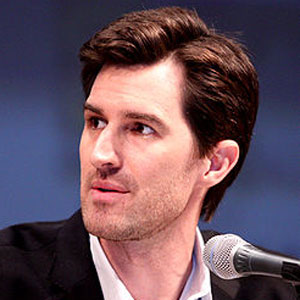Joe Kosinski Interview On Directing 'Oblivion,' Tom Cruise, Special Effects
Joseph Kosinski has made a name for himself for films with spectacular and realistic visual effects that impress audiences and critics alike. He directed the 2010 science fiction film Tron: Legacy and this year's Oblivion, based on an unpublished graphic novel Kosinski wrote, which stars Tom Cruise.
Kosinski has a firm philosophy on how to create an immersive film world. “As director that it’s really important that you are very clear and concise and specific with your direction,” Kosinski told Uinterview exclusively. “I think sometimes bad visual effects are due to the fact that a visual effects company is put under the gun with either the director who’s making decisions, changing his mind at the last moment, or not being specific in what he wants, and the director’s job is to be very clear about what he wants, be able to communicate that, and make sure that you give your team an opportunity to do their best work.”
Kosinski attended architecture school at Columbia University Graduate School and later tried his hand at directing commercials. “Based on that commercial work I got a meeting with Disney about Tron: Legacy, and in order to get that job I kind of created a teaser trailer before the script was written,” Kosinski said. “That was that short that was shown at Comic Con in 2008, which was basically a trailer for a movie that didn’t yet exist.”
So what exactly happened at the end of Oblivion? "I always knew it was going to be a controversial ending and a provocative idea, but that’s exactly the reason I made this, because I love movies that pose questions like that, and get you thinking and talking about it after the movie’s over," Kosinski said.
Oblivion will be available on Blu-Ray and DVD on Aug. 6.
I think the idea of the film is — what is it that makes us who we are? Is it the flesh on our bones or is it our souls, our memories? I think the end of the film comes down on the side of saying that it’s our memories, our experiences, our souls that define who we are. So even though it’s Jack 52 at the end of the film, which is not the same Jack we’ve been following the whole film, he does have the same memories as Julia and therefore, in her mind it really is her Jack. I always knew it was going to be a controversial ending and a provocative idea, but that’s exactly the reason I made this, because I love movies that pose questions like that, and get you thinking and talking about it after the movie’s over.
I can say I think I’m spoiled for life now. He’s one of the hardest-working people I’ve ever known. So dedicated to making the best movie he can. He’s a real film lover. He’s got an incredible knowledge of film and has worked with some of my heroes in terms of filmmakers, so he knows a lot. He’s just a real pleasure to be around, a pleasure to work with, he really brings out the best in the crew because they see how hard he is working, and no one wants to look lazy when Tom Cruise is on set.
I have a couple of answers to that. One is, you want to work with the very best people that you can. This is the second movie I’ve done with Digital Domain, the first movie I did with Pixomondo and really enjoyed it. My two visual effects supervisors are two of the most talented guys, and the teams that worked on it were dedicated, so that’s a really important part, working with the right people. I think the philosophy of Oblivion was that the visual effects shots should feel like it was shot with the same camera and the same crew that all the photography was done with, so we used all the same concepts in terms of lenses and cameras and lighting, to make it as seamless as possible. Everything in the movie felt like it was captured in camera. And then I would say as director that it’s really important that you are very clear and concise and specific with your direction. I think sometimes bad visual effects are due to the fact that a visual effects company is put under the gun with either the director who’s making decisions, changing his mind at the last moment, or not being specific in what he wants, and the director’s job is to be very clear about what he wants, be able to communicate that, and make sure that you give your team an opportunity to do their best work.
The idea was to make it look like something that actually works, so we put a lot of time and effort into all those kind of levels, the design details, that real aircraft inspiration was kind of an old helicopter design called a Bell 47, crossing that with most modern fighting jets to create it. The actual one that we built for the movie was pretty functional – it had operational doors on the front and the back, a cockpit that could spin, switches and lights that really worked. So it did a lot of stuff that you see in the movie. Unfortunately, the flight part was all visual effects.
We filmed from March-July of 2012, so about five months to shoot the movie, and then another nine months of visual effects.
I had been listening to M83’s music when I wrote the short story in 2005, so that music was always connected to the story, in a way. When it came time to look for a composer for the film, I sat down with Anthony Gonzalez, who is the man behind M83, and found out that he was a huge film buff. It really was his dream to create a soundtrack for a science-fiction film. I teamed him up with Joe Traponese, who was the orchestrator on Tron: Legacy. It was an amazing collaboration. My goal was to create an original soundtrack for an original film, and I couldn’t be more happy with the music that we put together for this.
I don’t know, I don’t know what my next movie is yet. It could be a couple different things, but it won’t necessarily be science fiction, either. For me it’s all about just finding that idea or that concept or that world that I just can’t get out of my head and want to live in for a few years.
I think probably the one that’s most memorable to me is the scene – it’s a very simple scene – but there was a lot of work to get there, the scene where Jack is watering the flower on the top of the mountain in Iceland. That was a location that we could only get to by helicopter so everything, all of the equipment to film the shot, everything was carried up by helicopter the day before, and we shot that on a beautiful Saturday afternoon in Iceland, in the middle of nowhere, and that was one of those experiences I’ll never forget.
There’s something to filming, and exciting about shooting a movie in a place that actually exists because now for two movies I’ve had to kind of create everything around it. So there’s something exciting about that idea, but it’s all about finding the right choice.
I went to architecture school in New York, at Columbia, and then lived in New York for about five years after that, had my own digital shorts, kind of working in graphic design. The way I kind of got in was I made a couple of short films in New York, and based on that work, got a couple of small commercials, and based on that commercial work I got a meeting with Disney about Tron: Legacy. In order to get that job, I created a teaser trailer before the script was written, and that was that short that was shown at Comic Con in 2008, which was basically a trailer for a movie that didn’t yet exist.
I think the best science fiction has ideas and things that we can relate to in our everyday lives, to not only personal issues like identity and love, but also sort of more social ideas about control and the role of technology in our lives. So certainly that was something I was interested in exploring in this movie, but how people interpret that is kind of personal.
No, nothing official. More just something to talk about, but we’ll see. For me, I think the interesting aspect of this story would actually be the story before the movie opens, the story of the invasion, perhaps the story of Malcolm Beech when the invasion first happened, fighting on the streets of Chicago. So for me, a prequel, I think would maybe be the more interesting way to go.
I don’t play as much as I used to. I still have my saxophone and pull it out every once in a while mostly to impress my son, but I listen to all types of music. I still listen to jazz, I listen to a lot of electronic music, I listen to classical, I love original scores. I kind of take the mix depending on what project I’m working on.
RELATED ARTICLES
Get the most-revealing celebrity conversations with the uInterview podcast!






Leave a comment